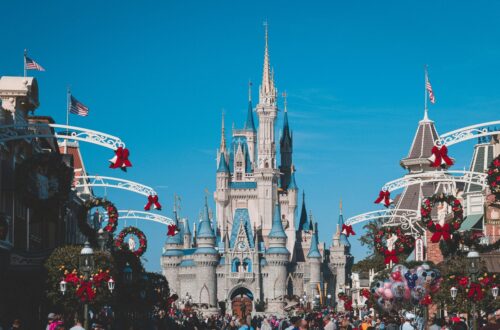Tomorrowland is more than just a themed land within Disney’s iconic parks; it’s a bold vision of humanity’s potential, a celebration of innovation, and a hopeful nod toward the future we might one day achieve. Since its debut in Disneyland in 1955, Tomorrowland has captivated audiences with its gleaming utopia of progress, serving as a bridge between imagination and reality. Yet, its legacy is layered with more than just dreams of jetpacks and monorails. Among its curiosities lies a particularly bizarre chapter: the enigmatic “Alien Encounters” TV special, a cultural artifact as strange and fascinating as Tomorrowland itself.
The Essence of Tomorrowland
Tomorrowland was conceived as Walt Disney’s optimistic prediction of a world propelled by technology and ingenuity. It was a place where guests could step into a living blueprint of humanity’s collective aspirations. Its attractions have evolved over the decades, mirroring our shifting dreams and fears: from the retro-futuristic charm of rocket ships and space stations to contemporary discussions about sustainability and interplanetary exploration.
At its heart, Tomorrowland reflects a fundamental human yearning: to understand what’s next. It’s a physical manifestation of our perpetual curiosity about the future. Yet, as much as Tomorrowland aims to inspire hope, it also poses subtle questions: Are we ready for the responsibilities that come with the technologies we create? Will the future we envision align with the realities we must confront?
The Alien Encounters TV Special: A Bizarre Chapter
In 1995, Tomorrowland found itself at the center of a peculiar piece of pop culture history: the TV special Alien Encounters: From New Tomorrowland. Narrated by Robert Urich, this hour-long program aired on ABC and was ostensibly created to promote the then-new attraction, The ExtraTERRORestrial Alien Encounter, in Walt Disney World. However, the special ended up being far more than a mere marketing tool; it became a surreal blend of science fiction, conspiracy theories, and genuine wonder about the universe.
The special explored themes of extraterrestrial life and government secrecy, borrowing heavily from the zeitgeist of the 1990s, when shows like The X-Files were captivating audiences. What made it particularly bizarre was its tonal dissonance: it oscillated between earnest speculation about alien contact and sensational claims that bordered on tabloid territory. Interspersed with dramatic reenactments and interviews with scientists, the special pondered the implications of first contact, urging viewers to consider how humanity might respond to visitors from beyond the stars.
While it may have seemed out of place in Disney’s otherwise optimistic narrative, the special tapped into a universal curiosity that aligns with Tomorrowland’s ethos. After all, the future is as much about confronting the unknown as it is about embracing progress. In some ways, the special’s eerie undertones served as a counterbalance to Tomorrowland’s shiny optimism, reminding us that not all discoveries are comforting.
Why It Resonates
The juxtaposition of Tomorrowland’s utopian ideals with the unsettling themes of Alien Encounters creates a fascinating tension. Tomorrowland invites us to dream, to innovate, and to believe in a better world. The TV special, on the other hand, asks us to grapple with the uncertainties and potential dangers that come with exploring new frontiers. Together, they paint a more nuanced picture of progress: one that acknowledges both its light and shadow.
Alien Encounters: From New Tomorrowland also serves as a time capsule, reflecting the cultural anxieties of its era. The 1990s were rife with speculation about UFOs and government cover-ups, fueled by declassified documents and a growing mistrust of authority. In this context, the TV special was both a product of its time and a subtle commentary on humanity’s enduring fascination with what lies beyond.
Tomorrowland’s Legacy and Lessons
Tomorrowland endures because it is more than just a theme park attraction; it’s a conversation about what it means to move forward. It’s a reminder that the future is not a fixed destination but a journey shaped by our choices, dreams, and discoveries. The inclusion of something as unconventional as Alien Encounters within its orbit underscores this point. Progress isn’t just about building faster rockets or smarter robots; it’s also about wrestling with the unknown, questioning our assumptions, and preparing for the unexpected.
As we stand on the brink of new technological and cosmic horizons, Tomorrowland’s message feels more relevant than ever. Whether we’re imagining life on Mars, grappling with the ethics of artificial intelligence, or pondering the possibility of extraterrestrial contact, the future beckons us to be both bold and thoughtful. And perhaps, just perhaps, to keep an open mind about who—or what—we might meet along the way.
Tomorrowland and Alien Encounters might seem like strange companions, but together they invite us to explore the full spectrum of possibility. From the brightest dreams to the darkest mysteries, they remind us that the future is a vast and uncharted frontier. And it’s ours to explore. Part 2

